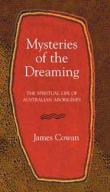AustLit
Latest Issues
AbstractHistoryArchive Description
'The Spiritual Life of Australian Aborigines'
'In Mysteries of the Dreaming, James Cowan brings to life Aboriginal spirituality in all its majesty. Men of Power, celestial journeys, meditational techniques, the complex calendar of ritual and ceremony and the role of the body as a spiritual icon are all explored in the context of this deeply religious, ancient race.' (Source: Publisher's website)
Publication Details of Only Known VersionEarliest 2 Known Versions of
Works about this Work
-
The Pleiades and the Dreamtime : An Aboriginal Women's Story and Other Ancient World Traditions
2012
single work
criticism
— Appears in: Coolabah , no. 9 2012; -
The Transnational Fantasy : The Case of James Cowan
2012
single work
criticism
— Appears in: Antipodes , June vol. 26 no. 1 2012; (p. 67-73) 'Recent criticism has seen the rise of an approach to literature that views texts as products of 'transnationalism,' a move that arises from a growing sense that, in a global age, authors should not be bounded by the traditional limits of national culture. In her book Cosmopolitan Style: Modernism Beyond the Nation (2006), for instance, Rebecca Walkowitz looks at how this trend has evolved in world Anglophone literature, extending from canonical writers like Joseph Conrad, James Joyce, and Virginia Woolf to such contemporary authors as Salman Rushdie, Kazuo Ishiguro, and W.G. Sebald. In the field of Australian literature, the question of transnationalism is often linked to issues of postcolonialism, as reflected in recent critical works like Graham Huggan's Australian Literature: Postcolonialism, Racism, Transnationalism (2007) and Nathanael O'Reilly's edited collection Postcolonial Issues in Australian Literature (2010), both of which examine how Australian literature and culture have metamorphosed in the new global context. While there is little doubt that world literature has been affected in important ways by this broadening of literary stage, there seems to be a widespread conflation between two similar but different terms: the transnational and transcultural. For while it is true that the culture of many countries arises from a cosmopolitan and diverse assortment of influences, this loosening of cultural boundaries between nations is far from being simultaneous with the decline of the state.' (Author's introduction)
-
James Cowan and the White Quest for Black Self
2001
single work
criticism
— Appears in: Australian Aboriginal Studies , no. 1 2001; (p. 1-20)'A literary genre is emerging in which Aborigines are cast as the spiritual saviours of the supposedly alienated Western self. One of the most prolific authors writing in this field is the Australian, James Cowan. Through a series of books Cowan moves further and further into the Aboriginal metaphysical realm until at last, he would have his readers believe, he actually enters the Dreaming and becomes an intrinsic part of it. In this article I critically examine these books, focusing on Cowan's construction of Aborigines and the sorts of claims he makes. I also consider some possible consequences of his particular portrayal of Aborigines. Despite his prominence in this field, and publishers' claims that he is 'an internationally respected authority on Australian Aborigines and other indigenous peoples', his work so far has received little critical analysis.' (Publication Abstract)
-
The Transnational Fantasy : The Case of James Cowan
2012
single work
criticism
— Appears in: Antipodes , June vol. 26 no. 1 2012; (p. 67-73) 'Recent criticism has seen the rise of an approach to literature that views texts as products of 'transnationalism,' a move that arises from a growing sense that, in a global age, authors should not be bounded by the traditional limits of national culture. In her book Cosmopolitan Style: Modernism Beyond the Nation (2006), for instance, Rebecca Walkowitz looks at how this trend has evolved in world Anglophone literature, extending from canonical writers like Joseph Conrad, James Joyce, and Virginia Woolf to such contemporary authors as Salman Rushdie, Kazuo Ishiguro, and W.G. Sebald. In the field of Australian literature, the question of transnationalism is often linked to issues of postcolonialism, as reflected in recent critical works like Graham Huggan's Australian Literature: Postcolonialism, Racism, Transnationalism (2007) and Nathanael O'Reilly's edited collection Postcolonial Issues in Australian Literature (2010), both of which examine how Australian literature and culture have metamorphosed in the new global context. While there is little doubt that world literature has been affected in important ways by this broadening of literary stage, there seems to be a widespread conflation between two similar but different terms: the transnational and transcultural. For while it is true that the culture of many countries arises from a cosmopolitan and diverse assortment of influences, this loosening of cultural boundaries between nations is far from being simultaneous with the decline of the state.' (Author's introduction)
-
The Pleiades and the Dreamtime : An Aboriginal Women's Story and Other Ancient World Traditions
2012
single work
criticism
— Appears in: Coolabah , no. 9 2012; -
James Cowan and the White Quest for Black Self
2001
single work
criticism
— Appears in: Australian Aboriginal Studies , no. 1 2001; (p. 1-20)'A literary genre is emerging in which Aborigines are cast as the spiritual saviours of the supposedly alienated Western self. One of the most prolific authors writing in this field is the Australian, James Cowan. Through a series of books Cowan moves further and further into the Aboriginal metaphysical realm until at last, he would have his readers believe, he actually enters the Dreaming and becomes an intrinsic part of it. In this article I critically examine these books, focusing on Cowan's construction of Aborigines and the sorts of claims he makes. I also consider some possible consequences of his particular portrayal of Aborigines. Despite his prominence in this field, and publishers' claims that he is 'an internationally respected authority on Australian Aborigines and other indigenous peoples', his work so far has received little critical analysis.' (Publication Abstract)




